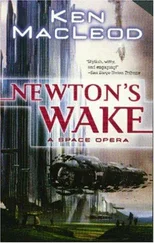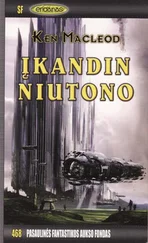“It’s going to be exciting,” she said. “You’ll never have seen it so dark. I’ll keep the lights off in here, so we can see out. We’ll see all the lights of the towns.”
“Why does the sunline have to go out?”
“We need the power plants to keep us warm and well,” said Synchronic. “And to take us to our new homes. We’ll have light and heat from the real sun there.”
“I’m scared.”
“There’s nothing to be scared of. Here, let me hold you up so you can watch it all.”
The sirens sounded again. Outside nothing moved except the great machines and tiny space-suited figures.
The sunline went out. The children gasped. Some of them cried. Despite herself Synchronic shivered.
As their retinae adjusted, she and the children saw that the darkness of the cylinder was not complete. Clusters of light were sprinkled across its whole interior.
“Look at all the towns!” Synchronic said. “Let’s put the lights on, and everyone will be able to see us too, and they’ll know we’re all right.”
Weeks later she stood again, this time alone, before the window and watched the air fall like snow. As more and more molecules crystallised out, their fall met less and less resistance, until the last specks hurtled down through vacuum. In time the entire internal atmosphere of the cylinder lay over everything like a thin layer of frost.
Across that chill scene the space-suited colonists swarmed in the tens of thousands, the machines in the hundreds. They still had much work to do.
Later: “Look, we’re all getting lighter.”
Later still: “We’re all floating! Isn’t this fun! Oh, let me help you clean that up.”
Then: “Look! The sun!”
The ends of the cylinder drifted away. The cylinder itself broke up into a thousand pieces, each an independent habitat, moving slowly apart. As their transfer orbit took them to the rich resources of the asteroids, the frozen air warmed up and streamed out behind them, to form the tails of a thousand comets, and the banners of a coming conquest.
21 — But the Sky, My Lady! The Sky!
Learning the World
14 376:10:21 12:17
Is this thing live ?
14 376:10:21 12:18
I see it is. How embarrassing. But I suppose it does none of us any harm to be reminded of our adolescent stumblings and fumblings. And I have to add, the person I was ten years ago got some things right. For the rest, well, my plea to the reader is to remember: people change. We grow up.
I don’t think, though, that I’ll add more entries to this long-neglected biolog. It seems fair to sum up, and to close it. I don’t flatter myself that everybody who reads this will know what has become of me and the people I mentioned, or even, perhaps — for not everything is recorded, and not all who remember are willing to recount — the early history of our settlement around the Destiny Star. If you, dear reader, are looking at this across some great gulf of time and increase of knowledge, spare me your condescension. You too were young once, and ignorant once, and from a future standpoint — perhaps your own — you are young and ignorant still.
A case in point. Two years ago, the first installment of a continuing stream of advice arrived from the Red Sun system. The burden of their frantic admonition was to avoid all contact with the indigenes, to stealth all our activities, to — as it were — act natural, in the hope that observers on the planet would mistake our arrival for some unusual but nonsentient phenomenon. The reason given, with frantic insistence, was that awareness of a vastly superior intelligence might cause the aliens’ culture to collapse from a sheer sense of futility.
Ha ha ha. A few days before Red Sun’s advice arrived, a clunky robot probe from Destiny II came snooping by.
The bat people want nothing from us. After they found that they had discovered two more radio sources, from hundreds of light-years away, that we had not so much as thought to look for, they held us not in awe. In their eyes we became, I suspect, merely the closest of the aliens that they had discovered. Our standing with them dropped even further when our own conflicts with each other became impossible to conceal. We assure them that the really violent episodes are few, and that only machines and resources are harmed and consumed in them, but they’re understandably not impressed.
I still blame Synchronic, frankly. It was her idea to steal a march on us while we were preoccupied with the contact. The resentments from that will take a long time to cool. Writs, claims, and counterclaims fly across the system to this day, and every so often some more tangible exchanges take place. It’s all very embarrassing, like a fight in front of the children.
But then — who are the children here? We were so certain that the aliens were about to plunge into conflict, between their powers and with the trudges. Our arguments were over whether and how to step in and sort it out. Yet as soon as they became aware of us and thought we were a threat to them all, they united — grudgingly and with mutual suspicion, it’s true — and as soon as they found rational beings emerging among the trudges, they treated them as equals. Well, perhaps not quite equals, but at least as rational beings like themselves.
In a sense, it’s we who are learning from them. The genetic machinery for transmitters still functions along with that for speech, and we can enter the virtualities at any time. I used to do that a lot, though not for some time now. As the translation software came to have more and more to work on, as the emancipated trudges began to take a full part in society, so the translation became more colloquial and precise. It created a sense of familiarity with the bat people’s institutions and ways that may be in part illusory. Are these teetering towers of logs and branches, mats and screens, within which alembics and astrolabes are plied, and little beasts cut up, and curious devices of glass and wire devised, really universities? Are these vast caverns of chirping, fluttering, sometimes brawling crowds really parliaments and councils of the realm? Or is that just another kind of translation, in which some subtlety — and indeed crudity — is lost? I know that when the verbal translation is off, I see things differently — what I’d seen as a nod or a smile becomes a twitch or a grimace; what had seemed a comfortable and well-appointed dwelling becomes a reeking hut on stilts; what had looked like an appetising meal a revolting carcass and a heap of rotting fruit.
But for all that, as I say, I hope we can learn from them. They are a more rational and kinder species. I have two theories to explain this. One is immediate and, as it were, specific. The other is more general, and one I must approach less directly, by way of some recent events.
The specific theory is this, and it’s very simple: they never bore the yoke. Because they had the trudges, they never enslaved each other. Because they had vast herds of wild prey and forests of fruit trees, they never toiled in fields. They fought, yes, they had their lords and kingdoms, but the discontented always had the possibility of flight. To cripple a human like a trudge was unthinkable, for all but the worst crimes. Compared with us, they had in every sense an easier ascent.
I turn now to the recent events, and my provisional final theory, which is at the same time my solution to the problem that bothered me from the first discovery of the aliens: a problem now increased, at the latest discovery of an alien radio source, thirteen times over. A Galaxy we had thought was empty is lighting up with intelligence, and all at once. What is strangest in that baffling simultaneity is the singularity of our precedence; and this I think I have at last understood.
Читать дальше












